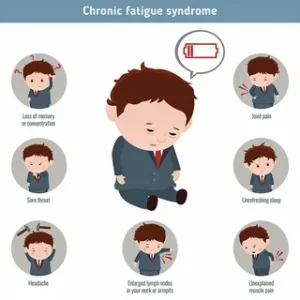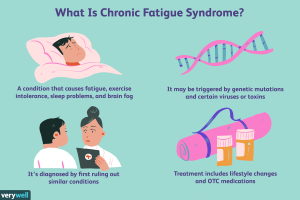Introduction Chronic Fatigue Syndrome, also known as myalgic encephalomyelitis (ME/CFS), transcends ordinary tiredness. This persistent state of fatigue, lasting at least six months, significantly disrupts daily life. Rest offers no relief, and physical activity can exacerbate symptoms, leading to post-exertional malaise. Key Symptoms of ME/CFS Beyond enduring fatigue, individuals with ME/CFS contend with various challenging
Introduction
Chronic Fatigue Syndrome, also known as myalgic encephalomyelitis (ME/CFS), transcends ordinary tiredness. This persistent state of fatigue, lasting at least six months, significantly disrupts daily life. Rest offers no relief, and physical activity can exacerbate symptoms, leading to post-exertional malaise.
Key Symptoms of ME/CFS
Beyond enduring fatigue, individuals with ME/CFS contend with various challenging symptoms:
- Persistent Fatigue: Lasts for a minimum of six months.
- Post-Exertional Malaise: Physical activity worsens symptoms.
- Sleep Disturbances: Frequent waking and morning exhaustion.
- Cognitive Challenges: Trouble concentrating and multitasking.
- Orthostatic Intolerance: Dizziness upon standing.

Image by: yendex.com
Flare-ups and Remissions
ME/CFS is characterized by unpredictable cycles of flare-ups and remissions. While there is no known cure, various treatments aim to manage symptoms. Severity varies, with mild cases allowing independence, moderate cases impeding movement, and severe cases rivaling the impact of other chronic illnesses.
Facts about ME/CFS
Understanding the prevalence and demographics of ME/CFS provides a broader perspective:
- Epidemiology: Approximately 2.5 million Americans grapple with ME/CFS.
- Demographics: Affects individuals of all ages, including children and teens.
- Gender Prevalence: More common in women, particularly those in their 40s and 50s.
- Severity Spectrum: While mild to moderate cases are widespread, severe symptoms afflict approximately one in four individuals.

Image by: yendex.com
How Does ME/CFS Happen?
Unraveling the mysteries of ME/CFS involves exploring various contributing factors:
- Immune System Abnormalities: Distinct immune system features are observed, but ME/CFS differs from conditions like HIV/AIDS.
- Energy Production Challenges: Cells struggle to generate sufficient energy.
- Brain Abnormalities: Irregularities in brain imaging, hormone levels, and the electrical system are noted.
- Blood Pressure and Pulse Dynamics: Orthostatic intolerance may cause dizziness or fainting.
- Genetic Factors: Some individuals inherit a genetic predisposition.
- Infections or Illness Trigger: ME/CFS often begins with an infectious-like episode, possibly linked to agents like Epstein-Barr virus.
Diagnosis Challenges
While the National Academy of Medicine provides guidelines for diagnosis, the absence of a definitive diagnostic test poses challenges. The ubiquitous nature of extreme fatigue across various conditions necessitates a thorough examination and a comprehensive symptom discussion with healthcare professionals to rule out alternative explanations.

Image by: yendex.com
Conclusion
In understanding Chronic Fatigue Syndrome, recognizing the multifaceted nature of its symptoms and the ongoing research into its causes is crucial. Navigating the complexities of diagnosis and treatment requires collaboration between individuals affected by ME/CFS and the medical community. Despite the challenges, raising awareness and fostering understanding are pivotal steps toward better managing and supporting those grappling with this intricate condition.

















Leave a Comment
Your email address will not be published. Required fields are marked with *